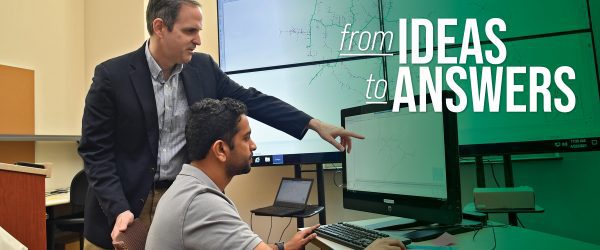Enhancing the reliability and resilience of the power grid — and training a new generation of energy experts

“The technology that makes our lives what we know it depends on the power grid — and our work has direct impact to grid contingencies like the recent electric power disaster in Texas, to help North Carolina avoid a similar situation.”
Sherif Abdelrazek ’14, M.S., ’15 Ph.D., was inspired by a seminar presented by the late Prof. Ahmed Zewael to pursue a career in energy while working toward a bachelor’s degree in electrical power and machines engineering in his native Egypt. When he learned about UNC Charlotte’s EPIC (Energy Production and Infrastructure Center) and its focus on supporting industry-focused research and development, he knew that was where he wanted to continue his education in electrical engineering.
“At UNC Charlotte, I had the opportunity to focus on research projects sponsored by industry leaders like Siemens Energy and major utilities such as Duke Energy,” he said.
Similarly, Sheikh Jakir Hossain ’19 Ph.D., participated in several industry research projects while pursuing a doctorate in electrical engineering at UNC Charlotte.
“EPIC and the Lee College of Engineering offer a wide range of research opportunities in my area of interest,” said Hossain, who earned an undergraduate degree in electrical and electronics engineering in his home country of Bangladesh before, like Abdelrazek, traveling across the globe to study in Charlotte. “My transition from academia to industry was smooth because of the training and exposure to real-world grid challenges and industry expertise available at UNC Charlotte.”
Now, both Abdelrazak and Hossain are applying what they learned through their experience with EPIC to careers at Duke Energy, Abdelrazek as a renewables engineering manager in energy storage and Hossain as a power systems engineer with the regulated renewables engineering team. Their professional trajectories fulfill a key goal of the public-private partnership formed in 2018 among UNC Charlotte, specifically, EPIC and The William States Lee College of Engineering